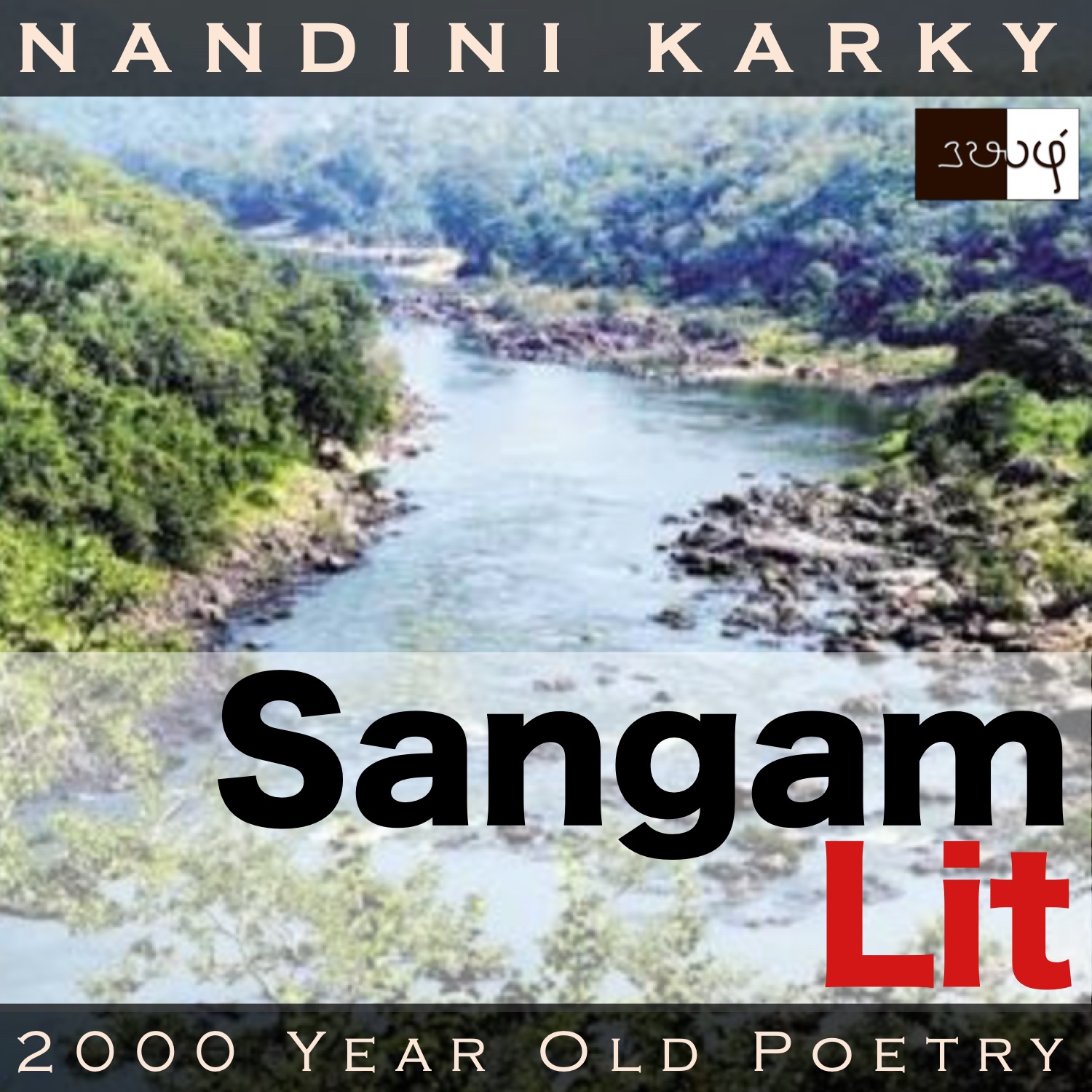Podcast: Play in new window | Download
Subscribe: Apple Podcasts | Spotify | Amazon Music | Android | iHeartRadio | TuneIn | RSS | More

In this episode, we perceive the dangers of a hill country at night, as portrayed in Sangam Literary work, Natrinai 144, written by Kachippettu Perunthachanaar. Set in the mountainous regions of ‘Kurinji’ landscape, the verse speaks in the worried voice of the lady to her confidante, as the man listens nearby.
பெருங்களிறு உழுவை தாக்கலின், இரும் பிடி
கருவி மா மழையின் அரவம் அஞ்சுபு,
போது ஏர் உண்கண் கலுழவும், ஏதில்
பேதை நெஞ்சம் கவலை கவற்ற
ஈங்கு ஆகின்றால் தோழி, பகுவாய்ப்
பிணவுப் புலி வழங்கும் அணங்கு அருங்கவலை
அவிர் அறல் ஒழுகும் விரை செலல் கான்யாற்றுக்
கரை அருங்குட்டம் தமியர் நீந்தி,
விரவு மலர் பொறித்த தோளர்
இரவின் வருதல் அறியாதேற்கே.
Right at the beginning, the poem brings to the fore, the fight between the ‘Big two’ of Sangam wildlife – ‘பெருங்களிறு’ and ‘உழுவை’ referring to the ‘bull elephant’ and ‘tiger’ respectively. No wonder the lady is worried! The phrase ‘கருவி மா மழை’ is said to refer to the ‘companions of a heavy rain’, indirectly to ‘thunder’. ‘கருவி’ which means ‘an instrument’ in contemporary Tamil, is used to mean ‘a companion’ here. A case of the side effect becoming the cause in linguistic terms! ‘உண்கண்’ is an expression which paints for us, the ‘kohl-streaked eyes’ of a Sangam woman. Curiously, the word ‘கவலை’ is used in two different meanings in the same verse. In one instance, it refers to ‘worry’ as in current-day lingo, and in another instance, as in the words ‘அருங்கவலை’, it refers to the harsh ‘path’ that one walks on. The words ‘அவிர் அறல் ஒழுகும் விரை செலல் கான்யாற்று’ is a documentary unto itself, about an ancient river. Let’s flow with the river to see where it takes us!
The man and lady have been in a love relationship for a while. When the man comes by to the lady’s home to tryst with her one night, making sure he’s in earshot, the lady turns to her confidante and says, “When the huge bull elephant is attacked by the tiger, the dark, female elephant cries aloud with the sound of thunder, that resounding companion of a downpour. These flower-like, kohl-painted eyes, start shedding tears, filled with fear. A confused heart, that knows not what to do, full of worry, is trembling here, O friend! A female tiger, with its mouth bared, roams the terror-filled, harsh path near the fast-flowing, wild river, which is filled with rippling waves many; a river so wide that shores cannot be glimpsed easily and deep too. In this river, on his own, swam my man, and arrived here with assorted flowers on his shoulders in the dark of the night. What can I say about my ignorance!” With these words, the lady highlights the many dangers in the man’s path and the immense worry that fills her heart as she contemplates it.
Time for a dive into the river! Astonishing how, so many Sangam poets have brought the attack of an elephant and a tiger to the fore, in their verses. Could it be just their imagination? I wonder because current studies show that tigers are known to avoid attacking elephants because of their huge size, but they may prey upon calves. Knowing this nature of the tiger, elephants too, are known to beat a retreat when hearing them nearby. So, it could be that the imagined conflict of these two animals seemed to add a certain drama to the proceedings and maybe that’s why this tussle is frequently mentioned in Sangam verses. Or another explanation could be, that behaviour of these animals were different then. Whichever may be the explanation, in a poetic sense, it’s fireworks seeing these two giants battling it out, and add the suffering female elephant to the picture and indeed, there’s an uproar of pain, which resounds like thunder all around that land. The lady likens herself to that female elephant crying out in pain. For she too, observes lethal things in the path of her man!
The lady goes on to illustrate those dangers. First, there’s a female tiger roaming with a bare open mouth, ready to devour anyone in its path. Then she talks about a wild river. She describes it as one, rushing forth at a great speed, filled to the full with mighty waves, so dark and violent too. She adds that it’s so wide that one can’t easily see the shores and deep too. The lady explains that it’s in this river the man swims to come meet with her. So, how does she know of this? It’s not because he tells her but because she notices the many, different flowers that stick to his shoulders, as he comes to meet her. These are the flowers that have dropped from the trees along the river’s shore, swept away by that wild river. No words are spoken and yet the lady sees everything, as if it were right before her. Saying all this, she describes how her heart worries thinking about all these dangers in the man’s path. Indirectly, the lady is passing on a subtle message to the man, urging him to give up this risky path and take up the safe one of seeking her hand in marriage. An intricate way of communicating a wish by expressing concern for the other!




//An intricate way of communicating a wish by expressing concern for the other!// — This line reminds me of Uyire song from the movie Bombay.
என் உயிர் போகும் போனாலும் துயரில்லை கண்ணே அதற்காகவா பாடினேன்..
வரும் எதிர் காலம் உன் மீது பழி போடும் பெண்ணே அதற்காகத்தான் வாடினேன்.
Expressing his wish by indirectly conveying concern for her 😀
An insightful connection, Subha!